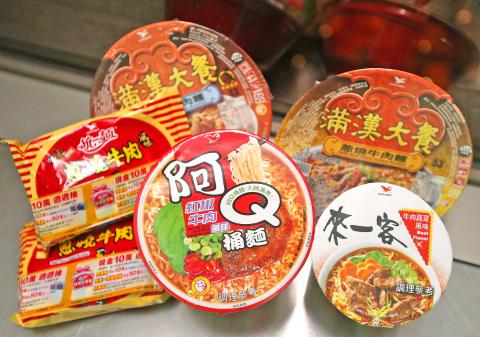Uni-President Enterprises Corp (統一企業), the nation’s largest food manufacturer, yesterday became engulfed in the nation’s latest cooking oil scandal, with 19 of its beef-based products ordered off the shelves, the Food and Drug Administration (FDA) said.
“Uni-President reported to the Greater Tainan Government’s Department of Health on Thursday that it had procured a batch of refined beef tallow weighing 5.57 tonnes from Ting Hsin Oil and Fat Industrial Co (頂新製油實業) via its oil and fat manufacturing subsidiary, President Nisshin Corp (統清) on June 10,” FDA Interim Director-General Chiang Yu-mei (姜郁美) told a press conference in Taipei.
Chiang said President Nisshin ordered 15 tonnes of beef tallow with Mitsubishi Corp (Taiwan) on May 29 after its oil refinery equipment broke down. The latter then purchased the oil from Ting Hsin Oil, which shipped the product directly to President Nisshin.

Photo: CNA
An investigation confirmed that the oil originated from Vietnam-based Dai Hanh Phuc Co, which lies at the center of the latest cooking oil scandal involving Ting Hsin Oil, Chiang said.
Dai Hanh Phuc Co is thought to have exported a total of 5,802 tonnes of falsely labeled animal feed-grade oil — including 3,216 tonnes of lard, 2,476 tonnes of beef tallow and 110 tonnes of coconut oil — to Ting Hsin Oil over the past three years.
The discovery has led to a recall of 54 Ting Hsin Oil products and eight beef tallow items, affecting dozens of food companies and nearly 100 foodstuffs, including Uni-President’s products.
Among Uni-President’s products are beef instant noodles (蔥燒牛肉風味) marketed under its Tong Yi Mein (統一麵) brand, chili beef flavor instant noodles (蔥燒牛肉麵) and beef flavor instant noodles (珍味牛肉麵) sold under its Imperial Big Meals (滿漢大餐) brand, as well as One More Cup’s various beef instant noodles.
Chiang said the administration was still working to determine the distribution of the remaining 9.43 tonnes of beef tallow President Nisshin bought.

Authorities have detained three former Taiwan Semiconductor Manufacturing Co (TMSC, 台積電) employees on suspicion of compromising classified technology used in making 2-nanometer chips, the Taiwan High Prosecutors’ Office said yesterday. Prosecutors are holding a former TSMC engineer surnamed Chen (陳) and two recently sacked TSMC engineers, including one person surnamed Wu (吳) in detention with restricted communication, following an investigation launched on July 25, a statement said. The announcement came a day after Nikkei Asia reported on the technology theft in an exclusive story, saying TSMC had fired two workers for contravening data rules on advanced chipmaking technology. Two-nanometer wafers are the most

DEFENSE: The first set of three NASAMS that were previously purchased is expected to be delivered by the end of this year and deployed near the capital, sources said Taiwan plans to procure 28 more sets of M-142 High Mobility Artillery Rocket Systems (HIMARS), as well as nine additional sets of National Advanced Surface-to-Air Missile Systems (NASAMS), military sources said yesterday. Taiwan had previously purchased 29 HIMARS launchers from the US and received the first 11 last year. Once the planned purchases are completed and delivered, Taiwan would have 57 sets of HIMARS. The army has also increased the number of MGM-140 Army Tactical Missile Systems (ATACMS) purchased from 64 to 84, the sources added. Each HIMARS launch pod can carry six Guided Multiple Launch Rocket Systems, capable of

CHINA’s BULLYING: The former British prime minister said that he believes ‘Taiwan can and will’ protect its freedom and democracy, as its people are lovers of liberty Former British prime minister Boris Johnson yesterday said Western nations should have the courage to stand with and deepen their economic partnerships with Taiwan in the face of China’s intensified pressure. He made the remarks at the ninth Ketagalan Forum: 2025 Indo-Pacific Security Dialogue hosted by the Ministry of Foreign Affairs and the Prospect Foundation in Taipei. Johnson, who is visiting Taiwan for the first time, said he had seen Taiwan’s coastline on a screen on his indoor bicycle, but wanted to learn more about the nation, including its artificial intelligence (AI) development, the key technology of the 21st century. Calling himself an

South Korea yesterday said that it was removing loudspeakers used to blare K-pop and news reports to North Korea, as the new administration in Seoul tries to ease tensions with its bellicose neighbor. The nations, still technically at war, had already halted propaganda broadcasts along the demilitarized zone, Seoul’s military said in June after the election of South Korean President Lee Jae-myung. It said in June that Pyongyang stopped transmitting bizarre, unsettling noises along the border that had become a major nuisance for South Korean residents, a day after South Korea’s loudspeakers fell silent. “Starting today, the military has begun removing the loudspeakers,”